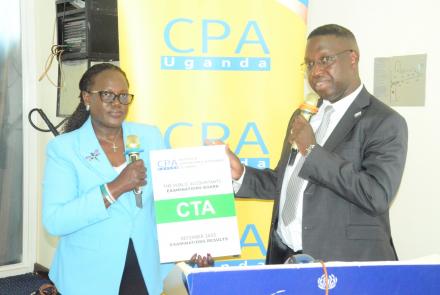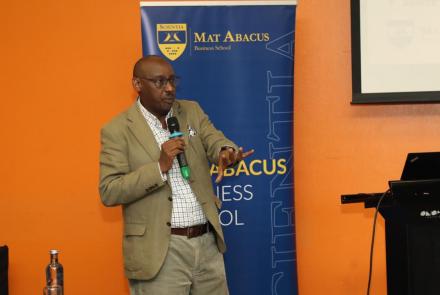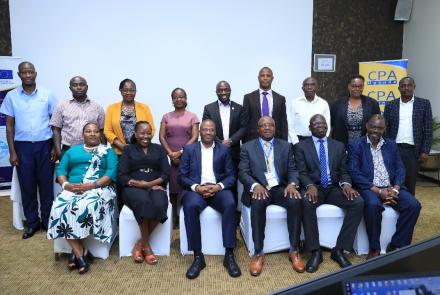PET: How to document your practical experience
By CPA Ambrose Kariyo Mugisha
Head of Education & Training,
ICPAU
Practical Experience Training (also known as PET) is when a CPA Associate or student undertakes real-life work of a financial, business and/or commercial nature with an organisation. The knowledge, skills and experience gained as part of practical training are invaluable in giving the trainee the opportunity to put what he or she has learned through the Certified Public Accountants (CPA) course into practice.
The graduate of PET is armed with professional competence and professional skills and values necessary for performing a role of a professional accountant. You will be able to hit the global market with all the confidence desired.
According to Section 5 (2) of the Accountants Act, 2013, a person shall be eligible for full membership of the Institute if he or she passes the qualifying examinations conducted by the examinations board and completes the practical training prescribed by the Council.
Benefits
Practical experience training provides aspiring CPAs with the opportunity to:
- Apply the technical knowledge gained during their CPA course studies.
- Develop business awareness skills.
- Exercise professional judgement.
- Develop strong oral, written communication and presentation skills.
- Accept progressively higher levels of responsibilities in an organisation.
- Compete globally with other professional accountants.
How much time should one spend on this training?
The Accountants Regulations, 2016 require a minimum period of three years of PET.
The good news is that the three-year period of practical training may be acquired before, during or after exam qualification.
Please note that, if you already have related experience, it can be documented at any time of choice before applying for ICPAU membership.
Required Competences
Aspiring CPAs must demonstrate their competence in both technical and non-technical areas.
Technical Skills:
An individual is required to obtain technical competencies in at least three of the following technical fields as summarised below:
- Financial Accounting including execution of accounting process, applying accounting standards, preparing reports in accordance with the requirements and policies.
- Audit and Assurance such as planning the audit process, and implementing audit procedures. This can apply to both external and internal audits.
- Taxation such as analysis of tax profiles, computation of different tax heads, preparation and filing of tax returns.
- Financial Management such as developing financial strategy, participation in financial operations and risks.
- Management Accounting such as participating in budgeting and budgetary controls, planning and monitoring performance.
- Insolvency Practice such as planning and assessing insolvency engagements, and participating in strategies for business rescue and recovery.
- Information Technology such as applying appropriate information systems and tools to business and accounting problems, assisting to assess accounting information systems and develop the accounting information systems strategies.
Non-Technical Skills:
These are generally soft skills.
Aspiring CPAs are required to obtain suitable practical training in all of the following non-technical fields below:
- Communication skills, which include communicating ideas and information effectively and efficiently, identifying and meeting needs of internal and external stakeholders.
- Professional skills and behaviour such as managing personal time effectively, acting ethically, and conveying a professional image.
- Interpersonal and organisational skills such as working well with others, demonstrating leadership, planning and monitoring activities, solving problems, proposing solutions, and making decisions.
Please note that, where experience is obtained in a field where the competencies have not been defined as indicated, it is the responsibility of the supervisor/mentor to agree on a set of benchmarks with the Institute, and may be considered.
Supervisor/Employer/Mentor
Students and associates are responsible for finding their own supervisors/employment.
The supervisor will act as a professional role model expected to exhibit a high level of professionalism at all times. The supervisor should be a member of the Institute. He or she has the responsibility of directing, advising and assisting trainees in acquiring sufficient practical training. It should be noted that, the supervisor/mentor can be different from the administrative supervisor at your formal employer.
The organisation/employer is expected to offer trainees the breadth and depth of training and work experience and the appropriate professional environment in which to develop the competencies required to become Certified Public Accountants.
The supervisor ensures that:
- The aspiring CPA is able to seek guidance and advice on matters relating to their practical training.
- Practical training is properly monitored, guided and verified.
What happens when the organisation providing PET opportunities does not have a member of the Institute?
Such an organisation may be engaging external auditors and is advised that students/associates contact the auditor for mentorship, otherwise an arrangement is made with your employer to agree on any other member.
How do you register to document practical experience on the ICPAU portal?
Log into the portal to access your account/page using your student ID number and password. A statement in a link can be checked that ‘you are eligible for practical experience training’.
Click the link. At this stage, guidelines on PET appear. Ensure you read and confirm that you understand the guidelines.
Apply/register. During registration, the system will also require you to submit the membership number of the supervisor. Once approved, you should be able to access the logbook in which the experience can be regularly recorded.
Recording Practical Experience in a Logbook
The logbook has various fields in which to document your experience as earlier indicated on the skills needed.
It is important to ensure that a comprehensive and continuous record of all practical training is kept/saved on the portal. The mentor will be able to access your logbook when he or she logs in as a member.
It is the responsibility of the trainee to regularly remind the mentor of the progress so that the experience can be reviewed.
In the next article, we will discuss the role of the employer/supervisor/mentor, and tips to record and review of experience among other related issues.
I wish you a smooth journey towards professionalism!




